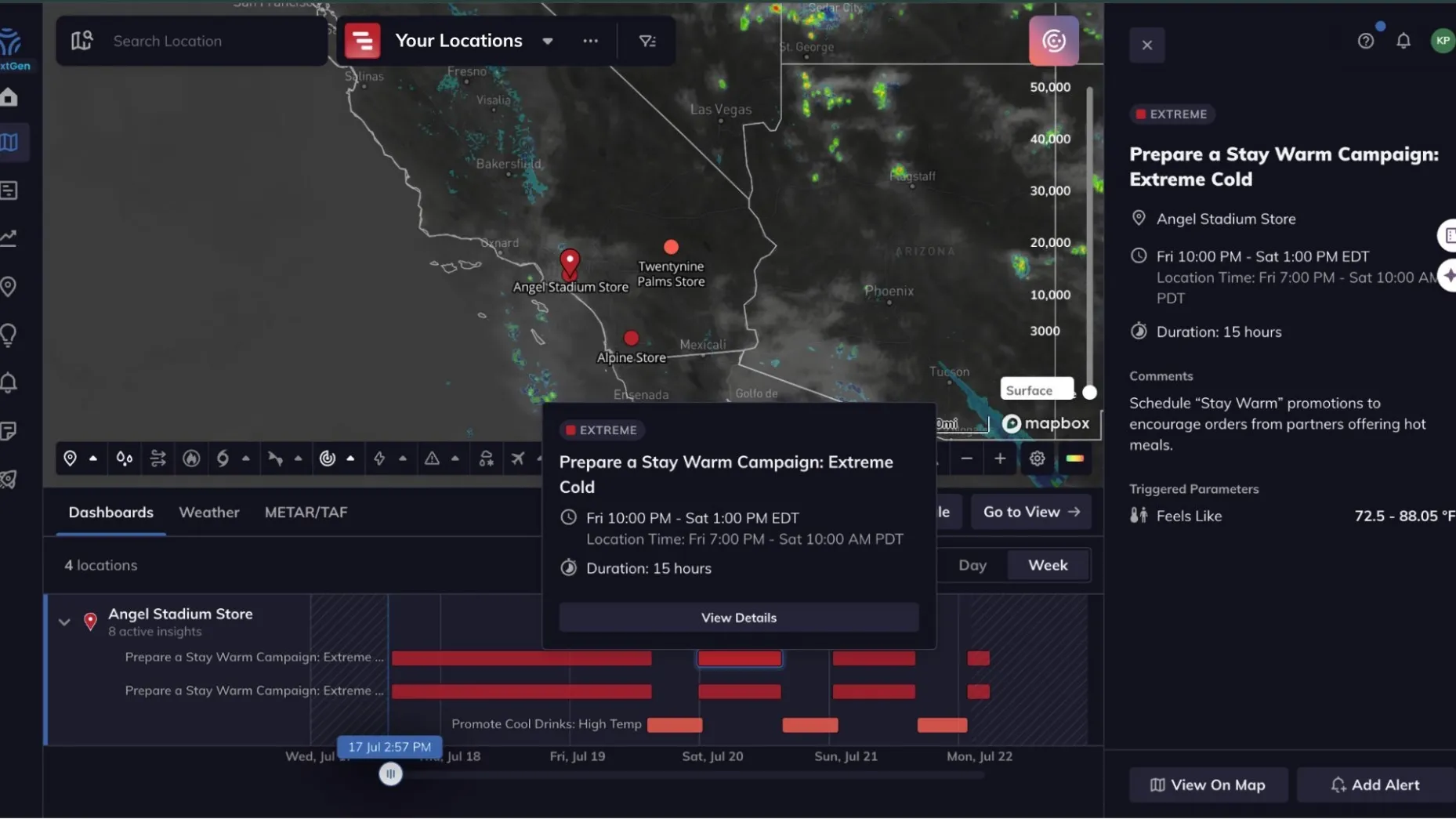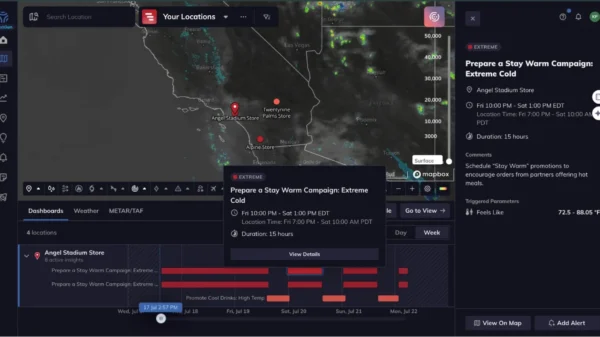TL;DR:
- Weather intelligence platforms are crucial for industries dependent on weather
- Tomorrow.io’s Resilience Platform™ leads in 2025 with predictive insights and automation
- Other top platforms include IBM’s The Weather Company and DTN
- Each platform offers unique strengths for business resilience
- Tomorrow.io stands out with impact-based alerts and customizable features
When your operations depend on the weather, uncertainty is expensive.
In industries like aviation, logistics, construction, and energy, a surprise thunderstorm can shut down an entire day’s work. And as extreme weather grows more frequent and volatile, resilience has shifted from reactive to proactive.
That’s where weather intelligence platforms come in, offering more than just forecasts. They deliver operational foresight, turning raw data into clear, decisive action.
We analyzed the top platforms leading the way in 2025 to help you make an informed choice.
What Makes a Great Weather Intelligence Platform?
Not all platforms are built the same. For business resilience, we looked at the following:
- Actionability: Can it turn forecasts into decisions?
- Customization: Are insights tailored to specific operations?
- Alerting: Does it provide real-time, location-specific alerts?
- Predictive Power: How far in advance can it warn of disruptions?
- Integration: Does it fit easily into existing workflows?
- Coverage: Is it global, local, or both?
The Best Weather Intelligence Platform in 2025: Tomorrow.io’s Resilience Platform™
Why Tomorrow.io is #1
Tomorrow.io is forecasting the impact of weather on your operations.
With over 80 proprietary weather and environmental data layers, AI-driven forecasting models, and space-based observations from its own satellite constellation, Tomorrow.io’s Resilience Platform™ is purpose-built for organizations that need to make critical decisions in real time.
From predictive dashboards and early warning systems to API-driven integrations and automated playbooks, Tomorrow.io transforms weather from a risk into a competitive advantage.
Key Capabilities:
- Impact-Based Forecasting for any asset or location
- Dynamic Routing for logistics and aviation
- AI-Powered Playbooks that automate response actions
- Historical, Real-Time & Forecasting APIs
- Satellite Data from proprietary radar-equipped satellites
- Fully Custom Alerting based on your specific thresholds
Who Uses It?
JetBlue. The U.S. Air Force. Uber. Ford. And hundreds of others who can’t afford to guess when the next storm hits.
🔗 See the Resilience Platform™ in action →
9 Other Weather Intelligence Platforms to Know in 2025
While Tomorrow.io leads the pack, these other solutions may fit niche needs or be useful as supplementary tools.
2. The Weather Company (an IBM Business)
IBM’s Weather Company blends hyper-local forecasting with AI and analytics. It offers visualization capabilities and integration into IBM’s broader analytics ecosystem.
Use Cases: Media, retail, aviation
Pricing: Enterprise custom pricing
3. DTN
DTN offers industry-specific weather intelligence, in agriculture, energy, and transportation. Its tools include storm tracking, wind energy forecasting, and maritime risk solutions.
Use Cases: Agriculture, utilities, energy
Pricing: Tiered enterprise packages
4. AccuWeather for Business
AccuWeather’s enterprise solution provides customizable alerts, operational dashboards, and severe weather updates.
Use Cases: Events, retail, schools
Pricing: Tiered packages starting at $25/month
5. Climavision
Climavision is developing radar and satellite coverage in areas with data gaps.
Use Cases: Aviation, outdoor events, public safety
Pricing: Contact for pricing
6. Spire Weather
Spire uses satellite-based radio occultation to collect data across the globe.
Use Cases: Aerospace, shipping, global logistics
Pricing: Custom pricing for enterprise
7. TomorrowNow.org (Weather for Vulnerable Communities)
A unique nonprofit angle, TomorrowNow provides impact-based weather forecasting tools for NGOs, public sector agencies, and vulnerable populations.
Use Cases: NGOs, local governments
Pricing: Tiered, with free options for public good
8. Sferic Maps by Earth Networks (AerisWeather)
A visual-first platform with tools for real-time tracking of lightning, storms, and other hazards.
Use Cases: Education, emergency management
Pricing: Starts at $23/month
9. Visual Crossing
Visual Crossing delivers historical weather data and forecasting tools.
Use Cases: Insurance, finance, logistics
Pricing: Free tier available; starts at $35/month
10. OpenWeatherMap (Enterprise Edition)
API-first solution offering global weather datasets.
Use Cases: Smart cities, IoT platforms
Pricing: Free tier available; enterprise plans scale
Why Tomorrow.io Stands Apart
While others focus on forecasts, Tomorrow.io focuses on foresight.
The Tomorrow.io Resilience platform is fundamentally differentiated on three levels: the data, the model, and the feature suite.
Together, these form a comprehensive system designed for organizations that need prescriptive, operationally relevant weather intelligence.
With predictive insights, automation tools, and full-stack integrations, weather intelligence from Tomorrow.io doesn’t just tell you what the weather is—it tells you what it means for your business and day-to-day.
When every minute matters, this is the kind of intelligence that keeps operations running, teams safe, and costs down.
Ready to Move from Forecasting to Foresight?
Let’s talk about how to put resilience systems in place—before the next weather event disrupts your operations.
Request a demo of Tomorrow.io’s Resilience Platform™
FAQ
What are the top 10 weather intelligence platforms for business resilience in 2025?
The leading weather intelligence platforms helping businesses boost operational resilience in 2025 include:
- Tomorrow.io’s Resilience Platform™
- IBM’s The Weather Company
- DTN
- AccuWeather for Business
- Climavision
- Spire Weather
- TomorrowNow.org
- Sferic Maps by Earth Networks
- Visual Crossing
- OpenWeatherMap (Enterprise Edition)
Each platform brings unique strengths, but Tomorrow.io stands apart with predictive insights, automation, and fully customizable impact-based alerts—turning weather risk into resilience.
What is a weather intelligence platform, and why is it crucial for business resilience?
A weather intelligence platform goes beyond traditional forecasts by turning raw weather data into actionable insights tailored to a business’s operations. Instead of just saying what the weather will be, it connects the dots to show how that weather will impact assets, employees, customers, and supply chains.
For business resilience, this is critical. Extreme weather events are increasing in frequency and severity, and even routine weather can cause costly disruptions. By proactively understanding risks, companies can prepare, adapt, and maintain continuity—reducing losses, protecting people, and ensuring smoother operations in the face of uncertainty.
What key features should a top weather intelligence platform offer?
The best platforms combine advanced science, technology, and usability. Key features include:
-
Hyperlocal Forecasting – Precision down to street or asset level, not just regional outlooks.
-
Impact-Based Insights – Translates weather into operational risks (e.g., flight delays, supply chain slowdowns, power outages).
-
Automation & Alerts – Customizable notifications that trigger action plans automatically.
-
Scenario Planning & Simulation – Tools to model “what if” scenarios and stress-test resilience strategies.
-
Integration & Accessibility – Easy API connections and dashboards that embed into existing workflows.
A platform with these features empowers businesses to move from reactive responses to proactive, data-driven resilience.
| Rank | Company |
|---|---|
| 1 | Tomorrow.io’s Resilience Platform |
| 2 | The Weather Company |
| 3 | DTN |
| 4 | AccuWeather for Business |
| 5 | Climavision |
| 6 | Spire Weather |
| 7 | TomorrowNow.org |
| 8 | Sferic Maps by Earth Networks |
| 9 | Visual Crossing |
| 10 | OpenWeatherMap (Enterprise Edition) |





